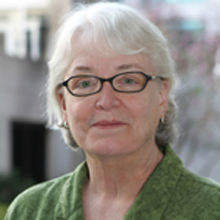
For more than 30 years, the Feminism and Legal Theory (FLT) Project has fostered interdisciplinary examinations of the ways in which the interaction of law and culture shapes expectations, policies and practices related to gender.
A four-part workshop series, "Geographies of Violence: Place, Space, and Time", is being held Jan. 24-25 at Emory Law's Gambrell Hall and takes stock of those years of scholarship and looking toward future developments in key areas of concern for feminist legal theory.
An April 24-25 workshop series will examine labor and employment; issues of sex and reproduction and the family were the topics of a series this past fall semester.
In addition, the FLT Project hosts visiting scholars from around the world with current visitors in residence from India, China, Chile and the United States.
Emory law professor Martha Albertson Fineman notes that three decades ago when she founded the FTL Project, feminism's most visible goal was equality — equal rights, equal pay, and equal access to workplace opportunities. While there has been undeniable progress for women in many areas of law since 1984, some areas, such as reproductive rights and their relationship to pay equity, are still at issue. Formal equality isn't always the solution, says Fineman, who is Robert W. Woodruff Professor of Law; sometimes it is the problem.
"When you're considering what is just and equitable at divorce, equal division of the burdens and benefits existing at that time will result in considerable inequities — because it does not take into account inequalities that existed across the life of the marriage, many of which will also affect future opportunities," Fineman explains.
"Three kinds of inequalities should be taken into account when deciding property division, post-divorce support, and custody: inequalities in the labor market; inequalities in the bargaining power between spouses relating to earning power that make the primary wage earners' interests paramount in family decisions; and inequalities in the burdens associated with being the primary caretaker of children both in and after marriage."
In a recent critique, Fineman highlighted that the social good of children benefits more than the individual family and thus triggers the state's responsibility. This responsibility, says Fineman, "takes us well beyond mere maternity benefits, into the argument for social welfare policies benefiting child producers or caretakers and the children they ‘produce.' It makes it mandatory that society, including the market, share the costs and burdens associated with not only bearing, but also caring for the next generation."
Fineman started the FLT Project to provide "a safe place to develop feminist legal theory." It was a brand new area in law and legal studies and not all law schools were receptive to feminist scholars. The Project produced the first anthology of feminist legal theory, "At the Boundaries of Law", in 1990.
Besides addressing the intersection of gender with issues relating to age, race, class, ability and sexuality, the Project has also generated the Vulnerability and the Human Condition Initiative. This initiative brings together diverse perspectives and disciplines to advance a social justice framework rooted in the universality of human vulnerability and the need for a responsive state.
Fineman sees a need for vulnerability theory in today's world: "If we look at American society, we see a long and growing list of material and social inequalities; we have no guarantee of basic social goods such as food, housing, and health care, and we have a network of dominant economic and political systems that not only tolerate, but justify grossly unequal distributions of wealth, power, and opportunity," Fineman wrote in a 2008 article for the Yale Journal of Law and Feminism.
"Vulnerability should be recognized as the primal human condition. As embodied beings we are constantly susceptible to harm, whether caused by disease and physical decline or natural or manufactured disasters," Fineman explains. She notes that as humans, we are innately dependent on the provision of care by others when we are infants, and often when we are ill, aged, or disabled.
Fineman concedes that vulnerability may be most evident when we are infants, but argues that it is continuously present throughout life.
Recognizing vulnerability has political and policy implications.
With principles of autonomy, self-sufficiency, and the restrained state still firmly entrenched in American discourse, Fineman reflects that there is still a lot of hard political and theoretical work to do. But there are encouraging signs of progress. For example, the legal research database company Hein Online is creating an online repository of the Project's work and papers. Fineman takes the long view on that progress, hopeful that she is "part of an historic process that will result in progressive change."
